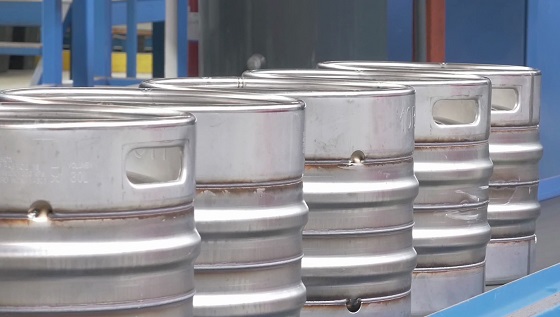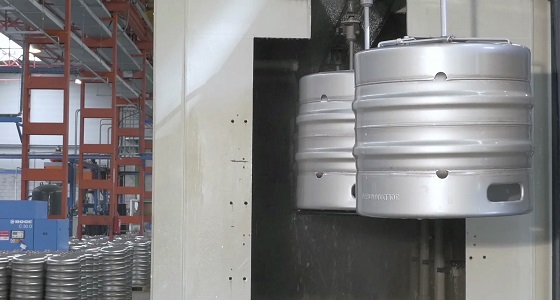Stainless steel (SS) beer barrel manufacturer Envases Técnicos Zaragoza S.L. (Entinox) (Zaragoza, Spain) is now utilizing an innovative surface treatment process from Henkel (Düsseldorf, Germany) to help prevent corrosion at its state-of-the-art keg plant in Zaragoza.1
The technique utilizes a new pickling and passivating line known as Henkel’s C-CP 1300 Bonderite† process, which does not include nitric acid (HNO3). The absence of HNO3 helps ensure there are no nitrogen oxide (NOx) emissions, which can be difficult and costly to remove.
“Our process was developed with a clear target to eliminate the risks associated with HNO3 in traditional mixed acid pickling systems,” explains Ronald Elemans, business development manager for Henkel’s cleaners business. “Nitrogen oxide emissions from these systems can entail significant neutralization costs, and there is practically no feasible way of removing nitrate effluents in wastewater. Both factors also limit the possibility of increasing the productivity of the pickling process without heavy investments for NOx and NO3 ion removal.”
The beer barrel manufacturer’s new Zaragoza plant has a production capacity for up to 450,000 bbl annually and offers kegs in standard sizes of 20 to 50 L, as well as 7.75 and 15.5 U.S. gal (29.3 and 58.7 L). Various customized options are also available. The kegs are typically used for the transportation of beer to locations such as bars and restaurants.
Potential Pickling Problems
The surface treatment provider describes pickling as a surface treatment in which a corroded metal substrate is treated with a pickling solution, usually a liquid or gel. This can be done by immersion, spraying, or circulation in place.

Historically, pickling products have often been acidic. Their job is to remove oxides, corrosion, flash rust, weld discoloration, and scale from metal surfaces by etching off these contaminants. By doing so, contaminants cannot have a negative influence on factors such as paint adhesion.
After rinsing with water, the active metal will either have to passivate—such as with aluminum or SS—or be coated, in order to protect it from new corrosion. Although the etching step is necessary to remove all contaminants, it must be controlled to prevent the base metal from being attacked by the acid, which can reduce strength.
Based on this dynamic, the provider says its pickling solutions are equipped with inhibitors to ensure the pickling process takes place in a controlled manner. “Our inhibitors not only reduce metal loss, but also acid consumption and hydrogen development [shown by bubbles during pickling], which extends bath life,” the company explains. These inhibitors, which are also available as a single product additive and can be added to base pickling liquids, can reduce attacks and impede embrittlement caused by the absorption of hydrogen.
Better for Beverage Business
According to the surface treatment provider, the usual challenge for SS assets such as the Spanish manufacturer’s beer barrels lies in removing all scale, iron contamination, and welding oxides to achieve a fully passivated surface. For food and beverage assets, which are often visible to the public, the surface usually needs to achieve an even, clean, and aesthetic finish.
With key products such as beer kegs, the surface must also be completely free from any traces of pickling agents after the process. In addition, many manufacturers are facing increasingly strict health, safety, and environmental (HSE) regulations these days with regards to the release of potentially harmful substances, such as NOx emissions in air and nitrate effluents in water.
To address these concerns, the provider’s latest process can be used in spraying or immersion lines, and it is suitable for nearly all SS grades based on austenite, ferrite, martensite, or duplex. This is applicable to those with high-chromium qualities, the company explains. The system includes a starter for bath make-up; two R and Z components to maintain the acidity of the bath as well as the oxidizing and passivating capacity of the pickling solution; and an optional accelerator for use in hard-to-pickle materials, or in applications with limited contact times.
The Spanish manufacturer’s kegs are normally made from sheets of AISI Type 304L (UNS S30403) SS, which is one of the most widely used austenitic chromium-nickel steel alloys. After bending, forming, and welding, each keg has a surface of 2 m2 per barrel. Prior to pickling, the barrels are cleaned and degreased using a spray washer, before the R and Z mix is applied in another spraying step.
Beer Barrel Buffer
“The pickling quality and efficiency that we achieve with Henkel’s process is outstanding,” says Angel Roche, technical manager for Entinox. “While the resulting corrosion resistance is on par with that provided by mixed nitric acid-based systems, [this process] provides a significantly longer bath life. Moreover, as a more environmentally friendly nitric acid-free solution, it also eliminates the risk of nitric fumes within the production area. And the absence of hexavalent chromium means that all effluents can be treated in our existing wastewater plant.”

The surface treatment provider says the process has wide potential for leveraging similar cost and environmental benefits in other markets where SS is processed. These could include heat exchangers and chemical process equipment; SS devices and machines in the food and beverage industry; and other applications in the pharmaceutical and semiconductor segments.
†Trade name.
Source: Henkel Ltd., www.bonderite-solutions.co.uk.
Reference
1 “Henkel Process Helps Beer Barrel Manufacturer Improve Product Quality,” Bonderite News & Innovations, Nov. 8, 2018, http://www.bonderite-solutions.co.uk/en/news-innovations/news-nitric-acid-free-pickling-of-stainless-steel.html (Feb. 18, 2019).